- Home
- Donald Hamilton
The Ambushers Page 2
The Ambushers Read online
Page 2
“They will do what they can when the shooting starts,” he said. “I do not have very great hopes for their success, however. There are at least two hundred men in the village, I have just been told. A few of those are paid by us, of course, but they cannot help openly or their usefulness is at an end.”
“We’re supposed to give it a try,” I said. “But it’s a secondary objective and they’re your people. How hard you want them to try, under the circumstances, is for you to say. Is our primary objective at home?”
“Yes. I am told that he is expecting visitors by road before nightfall. We can hope that they will arrive before the light fails, and that he will come out of his hut to greet them. The entrance faces this way, as you will see when you get up there.” He inclined his head towards the top of the ridge.
“Sure.” I slid the pack off my back and got out the ten-power binoculars I’d brought along. “Will you assist me, Colonel, or can you assign me a man who speaks some English?”
“I will assist you personally.”
It was good in some ways, bad in others. “It is understood,” I said carefully, “that if I make requests or give instructions, I mean no disrespect for your rank.”
He gave me his thin smile. He was a good-looking little man; he must have been a pretty boy. I didn’t let that influence my judgment. Some of the meanest, switchblade-packing pachucos I’d known back home were real handsome kids.
He said, “It is understood.”
“Then I want you to take these glasses,” I said. “I want you to be watching through them when I fire. If I miss, you must tell me where it goes so I can correct the next shot properly.”
“There will not be time for many shots,” Jiminez said.
His expression didn’t change, but it was clear nevertheless that he didn’t like my talking about misses. One American agent had already missed.
I said, “If there’s time for one, there’s generally time for two. If I miss, look for the dust where it hits and give me the distance I’m off. In meters or fractions of a meter if you like. Give me the direction by the clock. Twelve o’clock, three o’clock, six o’clock, nine o’clock, or points between. You understand?”
“Si. I have shot at the targets, señor, if without much success. I understand. Just a moment.”
He rose and spoke softly to a man standing by, who seemed to be a non-commissioned officer of some kind. The NCO went over to a group of others and spoke to them, pointing to the ridge. They all started scrambling upward, fanning out. Jiminez returned and sat down again.
“We will let them get into position and dig in,” he said. “They will remain to cover us as we withdraw, as long as they can hold, outnumbered. Then they will retreat inland, while we hide overnight in a place that has been selected. If things go well, they will draw the pursuit after them and confuse it in the darkness, leaving us to make for the coast undisturbed tomorrow. It is a good plan, I think. Of course it will not work.”
I glanced at him quickly. “Why not?”
He shrugged his shoulders. “No battle plan has worked in every detail since the dawn of history, señor. Why should this one?” He glanced at his watch. “We should take our positions within ten minutes. We must be ready when the visitors arrive.”
“Sure.”
I reached for the plastic case and pulled the long zipper and broke the seal inside. I suppose it was a solemn moment, kind of like finally consummating the marriage after a long courtship. Well, the real consummation was still to come, but I’d spent a long time preparing this equipment and bringing it here; just taking it out should have been celebrated with a little ceremony, say a toast or a prayer. However, it was no time to be drinking, and I’ve kind of got out of the habit of praying. I just reached in first and found a little bag containing what looked like white gravel and tossed it to Jiminez.
“There’s your silica gel, Colonel,” I said.
Then I took the big rifle out of the case. It was a heavy match barrel on the long Mauser action, shooting a hand-loaded version of the .300 Holland and Holland Magnum cartridge that I’d cooked up myself. I slipped off the rubber bands and removed the corrugated cardboard that gave additional protection to the scope, a twenty-power Herrlitz. We’d used European components for the same reason that I’d dyed my hair and called myself Hernandez. American interference is kind of unpopular down there and tends to bring unpopularity on the party that requests it. If we were killed or caught, there wasn’t supposed to be too much Yankee debris left lying around.
The stock was a plain, straight-grained hunk of walnut without much sex appeal, but it was fitted to the barrel and action with artistry. A regular G.I. leather sling completed the outfit.
It was quiet in the ravine as I got ready, except for an occasional murmur of conversation among the five men who remained with us, and an occasional rustle or scuffle from above, where the men who were to protect our retreat and lead off the pursuit were getting set for phase one of their suicide assignment. I was glad I wasn’t the one who’d had to give those orders; on the other hand, I couldn’t help remembering that I was the one who had to make all risks and losses worthwhile. If I fluffed my part, as my predecessor had done, a lot of men might die here for nothing. Well, that wasn’t anything it would help to think about.
I saw the colonel pick up the case I’d dropped and slip the bag of silica gel back inside, closing the zipper. He looked at the gun I held.
“It is an impressive firearm,” he said.
“Let us hope the man we came to impress finds it so,” I said.
He glanced at me sharply and started to speak, but checked himself and was silent, watching while I rigged the rifle sling for shooting, and dug one box of cartridges out of the pack. They were big, fat shells. They looked as if an ordinary service round had had a clandestine affair with some anti-aircraft ammo. I could only get four of them into the gun: three in the magazine and one in the chamber. I stuck the box in my pocket and closed up the pack.
“Well, Colonel?” I said. “Let’s look the situation over.”
He hesitated. “You do not seem very confident, Señor Helm. You have some reservations?”
“What do you want me to do, claim the turkey before the target’s been scored? You want some shooting done, it says here. Or your president does. Let’s go.”
He did not move at once. I could see what he was thinking. He had no faith in me, and he was thinking that he was still not fully committed. He could still pull out, or try. He might get away; he might even make it back to the coast undetected, with his task group intact. As for the inefficient Americano, he would of course have to die so that he could not tell what had happened—in a brush with El Fuerte’s men, the report would state regretfully. It would be a very fine report, full of heroism and courage, the kind you send in to excuse a failure. With the American dead, who could contradict it except General Jorge Santos, who wouldn’t be asked?
All this went through his mind; then he shrugged and reached for my pack. “You want this brought, I suppose. I will carry it. Follow me.”
With the big rifle heavy in my hand, I followed him up through the brush. Below us, in response to a signal he gave as he passed, the five men in the ravine were picking up their weapons and drifting up into cover after us. I guess they constituted our mobile reserve, or something. The little man trotted up the slope at a slant, and I made my long-legged way after him, until he flattened out near the top and waved me down. We crawled the rest of the way.
A man lay behind the rock up there with a carbine. It was the NCO. He had several extra clips arranged in front of him. We crawled into a bush to his left and looked out.
It was worse than I’d expected. There was a road down the cleared valley below. I guess they grew some kind of corn there, but I never got close enough to be sure. The road was the usual two wagon ruts. Well down along it was the village. The huts weren’t much, mainly roofs thatched with some kind of leaves, supported by walls that looked
insubstantial and drafty, but the housing standards of rural Costa Verde weren’t my concern, and in that climate I guess you generally don’t need much more than a roof, anyway.
The place was full of men. They had several fires going. There were women among them. There were a great many weapons in evidence. That wasn’t my concern, either. At least it wasn’t supposed to be. The military aspects of the situation were the colonel’s worry. What did concern me was the fact that the nearest hut was at least a quarter of a mile away. I spoke softly without looking at the little man lying beside me.
“Which one?”
“It is the third hut along the road, on the left. The third from this end. Of course, when he emerges, he may come this way.”
“And he may go the other, too,” I said. “It depends where the damn visitors decide to stop. I was told the range would be approximately three hundred and fifty meters. Three hundred and eighty yards.” He did not speak. Still looking down the valley at the distant huts, I collected some saliva in my mouth and expelled it on the ground in front of me. “To use a phrase from your language, Colonel, I spit on your lousy three hundred and fifty meters, sir. Give me that pack.”
“Señor Helm—”
“Just give me the damn pack. Let’s see what we’ve actually got here. There’s no chance of getting closer, I suppose? What about that point of woods down to the right?”
“There is an outpost right below it. There are patrols. It was determined that the thing would have to be done from here.”
“Sure. Three hundred and fifty meters away. You grow damn long meters in this country, Colonel Jiminez.”
I pulled the pack in front of me for a rest and laid the rifle across it. I had to hunt a bit to pick up my target— those big target scopes have a narrow field—then the third hut was clear and sharp in the glass, but it still wasn’t exactly at arm’s length. It was going to be one hell of a shot, if I made it.
3
I lay there telling myself hopefully that at least the wind wasn’t blowing. As I watched through the scope, a man walked into the field of the instrument from the right and entered the hut, walking right through the scale and crosshairs. A moment later he reappeared, leaving, but stopped in the doorway, apparently addressed by someone inside. He answered respectfully, saluted clumsily, and walked out of the scope.
“Five hundred and fifty yards,” I said. “Approximately. That, Colonel, is over five hundred of your meters. Your informant was damn near fifty per cent off.”
“You can read the distance?” He sounded more interested than apologetic.
“There is a scale inside the telescope,” I said. “You take a man like that one, approximately five and a half feet tall—at least I hope he wasn’t a pygmy or a giant— and you place the lowest division of the scale at his feet and read the range opposite the top of his head, making allowance for the sombrero. Then you take this figure and enter the table I have attached to the stock of the rifle, here. You learn that to hit a target five hundred and fifty yards away, the way this particular rifle is sighted at this particular time, you must hold over eighteen inches. In other words, I will have to shoot for the top of the head to hit the chest.”
Actually, of course, I hadn’t ever believed their story of three hundred and fifty meters. I’d sighted in the rifle at four hundred and fifty yards, and run my compensation table from three to six hundred, just in case. There has seldom been a spy yet, or a hunting guide for that matter, who wouldn’t underestimate a range badly. You always hope the day will come when somebody will hand you the straight dope, but a fifty per cent error wasn’t much more than par for the course.
“That is truly scientific,” Jiminez said. I couldn’t tell whether he was being ironic or not.
“Sure,” I said. “It assumes I can find a man the right size to take the range from, and that he’s standing up straight, and that I’m not looking at him from too great an angle up or down. It assumes the gun is shooting where it was when I made up the table, a few thousand miles away in a different climate. And at five hundred meters, Colonel, it takes this bullet the better part of a second to reach its target. A running man can cover thirty feet in one second. You’d better pray the guy stands still for us. What do you want me to do afterward?”
“Afterward?”
“Do we pick up and run for it, or do we try to give your boys a hand in stopping the first rush?”
“That is for you to say, Señor Helm. I cannot ask you—”
“If you don’t ask,” I said, “who will? I’m sure as hell not volunteering; I gave that up when I got old enough to vote, or a little before. But El Fuerte’s men have got an open valley to cross, and I’ve got sixty rounds of ammunition nobody told me I had to bring home. Once we’re back in the woods, this gun is useless. With a twenty-power scope, it’s got to be shot from a rest; it’s no good for jungle fighting. But right here I might do some good, if I’m so ordered by my commanding officer, in this case you.”
He hesitated and looked at me for a moment. He laughed softly. “Very well. It is an order. Señor Helm?”
“Yes, Colonel.”
“It is sometimes hard for men of different languages to understand each other. I may owe you an apology. I—”
He stopped abruptly, and picked up my binoculars, hanging from their strap around his neck. He crawled forward to focus them on the road where it came into sight below and to the left of our position on the ridge. I heard it now, the sound of a motorized vehicle approaching from up the valley. Well, that wasn’t anything I needed to look at.
I took off my hat quickly, and dumped the contents of the open box of cartridges into it, and set it where I could reach it easily. I took the other two boxes out of the pack and set them beside it. I closed up the pack again and replaced it to support the gun, and settled myself comfortably behind it. Then I made sure, by counting huts—one, two, three—that I was looking at the right one through the telescopic sight. With high magnifications at long ranges, it’s very easy to find yourself watching the wrong door or window, or even, if they’re all similar, the wrong house.
I shoved off the safety and double-checked, by looking, that it was really all the way off. That’s another mistake that’s been made by people who should have known better, including me.
“Colonel.”
“Yes, señor.”
“The hell with the jeep or whatever it is. Watch the doorway. Confirm the identification fast when he shows. And you’d better slide back a bit if you value your eardrums. This thing is loud.”
Then it was just a matter of waiting. I’m not an iron man; I had the usual quota of palpitation and perspiration. I resisted the temptation to turn my head to watch the progress of the jeep down the valley. One glance had told me it was a jeep, with a native driver and a man in sun helmet and khakis, who looked too tall and blond to be indigenous. That was all the glances I had to spare. I lay there forcing my body to relax along the ground. I was just an eye at the ocular, a finger on the trigger. A man went into the hut to announce the impending arrival and emerged. A moment later another man came into sight in the doorway.
He didn’t come all the way out right away. He had to tease us. He stopped in the shadow of the door to put on his uniform cap. The sunlight was bright on his thick body from the waist down, but the rest was in shade. I couldn’t be sure of my crosshairs and I hadn’t got an identification from Jiminez, anyway. I resisted the urge to ask a silly question. He’d speak when he was sure.
The man took a step forward, and another—and kept walking. My mind went through the calculation rapidly. At two miles per hour, he would move a couple of feet in the time it took the bullet to reach him. If I allowed for his motion, he could stop and it would strike ahead of him. He could speed up and it would strike behind.
“Shoot,” said Jiminez softly. “That is El Fuerte. Shoot!”
I’d worked too hard and come too far to risk my first shot at that range, on a moving target. He was a big ma
n, I saw, not tall but broad and solid, with the shoulders and arms of a gorilla. He had a scraggy, Castro-type beard, but he was a far cry from the lanky Castro type, physically speaking. El Fuerte, The Strong One. He was dressed in suntans, with that uniform cap. General Jorge Santos, pronounced Heneral Horgay Santos. He stopped at the side of the road to wait for the oncoming jeep. A couple of his men came up to wait beside him, one directly in the line of fire.
I could feel the sweat trickling down my face as I lay there, waiting. I heard Jiminez stir impatiently beside me, but he had sense enough to keep his trap shut. Five hundred meters away, General Jorge Santos took one step forward into the clear and turned to look up the road toward us. The crosshairs settled on the fancy insignia on the uniform cap, a tiny, gleaming aiming point so far away. I wasn’t aware of adding the last fraction of an ounce to the pressure already on the trigger, but the big rifle fired.
It made a hell of a noise in the quiet valley; it was like setting off a cannon-cracker in church. It slammed back against my shoulder and cheek. It’s not a fun gun to shoot.
“Call it,” I said, working the bolt fast and trying to pick up my target again in that lousy scope. “Call it, damn you!”
“He is hit,” Jiminez said calmly. “He is going down.”
Then I had my man back in the field. El Fuerte was being supported by his two companions, but his knees were buckling and there was blood on his shirt. His head was hanging and his cap had fallen off. I gave it the same rough eighteen inches of Kentucky elevation and fired again. There was the same damn volcanic eruption and the same piledriver blow against my face and shoulder.
“Bueno,” Jiminez said in his calm voice, but he’d forgotten to speak English. “Muy bueno! Uno mas?”
He was asking for one more, the bloodthirsty little bastard. I yanked the bolt back and slammed it home again, but there were more men around Santos now, and as I waited for a clear opening, the jeep drove up and stopped, blocking my view completely. I looked up. The whole village was stirring, but they didn’t really know what was going on. The thunderous report of the Magnum would have sounded vague and directionless down there, like distant blasting. At that range you can shoot at a deer all day, if you’re that bad a shot, and he’ll never even stop browsing until you land one close.

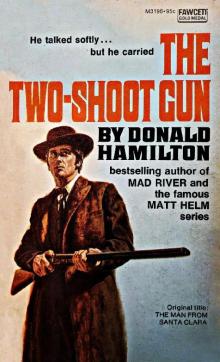 The Two-Shoot Gun
The Two-Shoot Gun Mad River
Mad River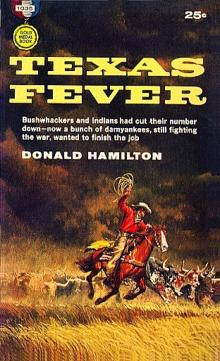 Texas Fever
Texas Fever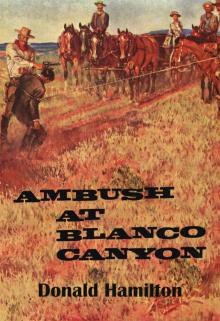 Ambush at Blanco Canyon
Ambush at Blanco Canyon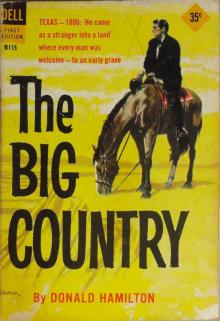 The Big Country
The Big Country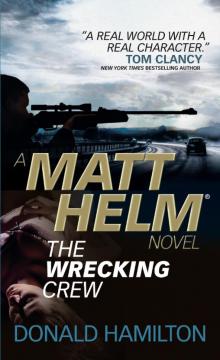 The Wrecking Crew
The Wrecking Crew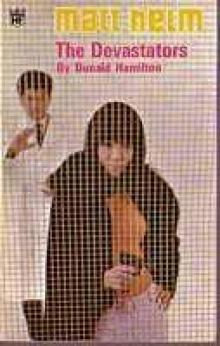 The Devastators mh-9
The Devastators mh-9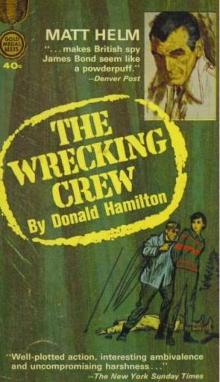 The Wrecking Crew mh-2
The Wrecking Crew mh-2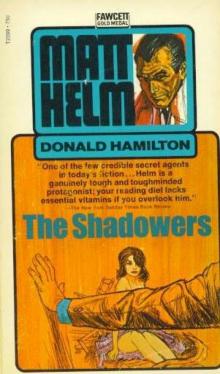 The Shadowers mh-7
The Shadowers mh-7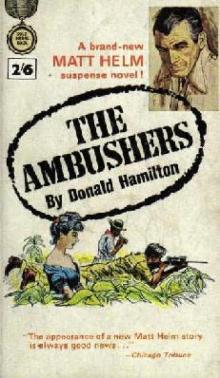 The Ambushers mh-6
The Ambushers mh-6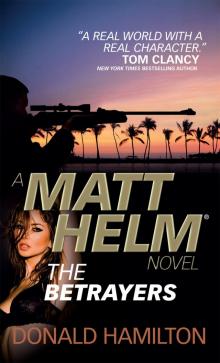 The Betrayers
The Betrayers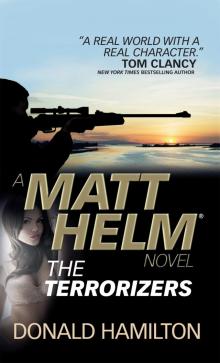 The Terrorizers
The Terrorizers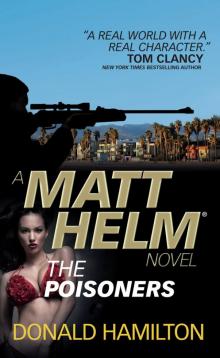 The Poisoners
The Poisoners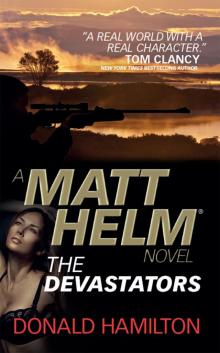 The Devastators
The Devastators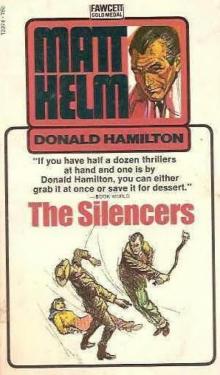 The Silencers mh-5
The Silencers mh-5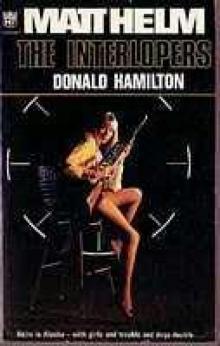 The Interlopers mh-12
The Interlopers mh-12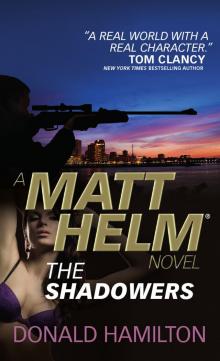 The Shadowers
The Shadowers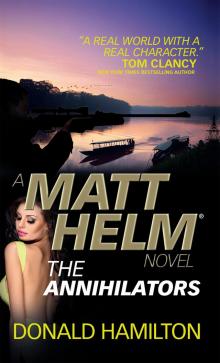 The Annihilators
The Annihilators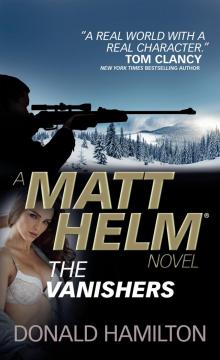 The Vanishers
The Vanishers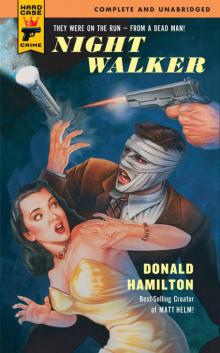 Night Walker
Night Walker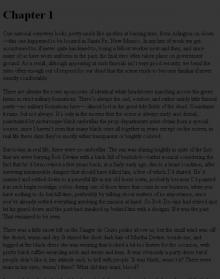 The Revengers
The Revengers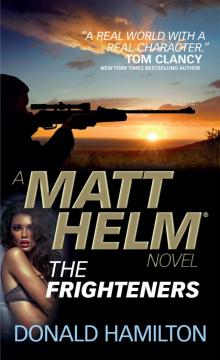 The Frighteners
The Frighteners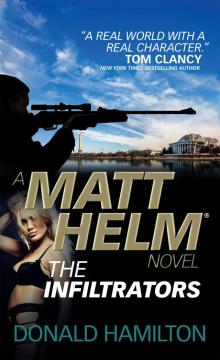 The Infiltrators
The Infiltrators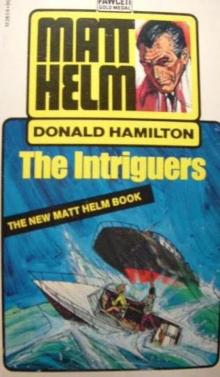 The Intriguers mh-14
The Intriguers mh-14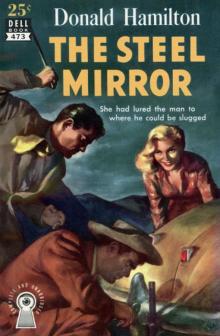 The Steel Mirror
The Steel Mirror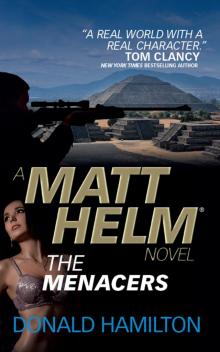 The Menacers
The Menacers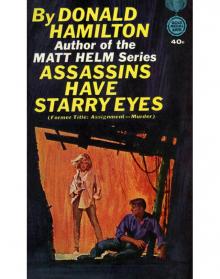 Assassins Have Starry Eyes
Assassins Have Starry Eyes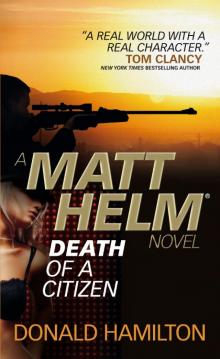 Death of a Citizen
Death of a Citizen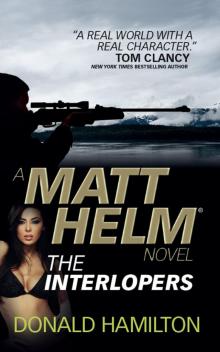 Matt Helm--The Interlopers
Matt Helm--The Interlopers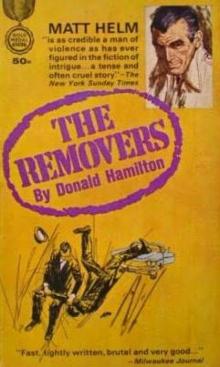 The Removers mh-3
The Removers mh-3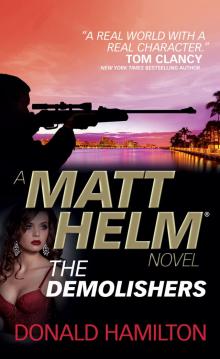 The Demolishers
The Demolishers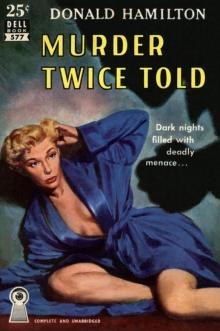 Murder Twice Told
Murder Twice Told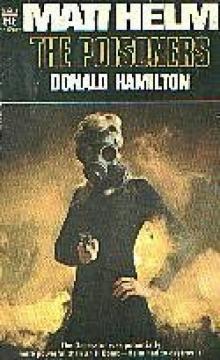 The Poisoners mh-13
The Poisoners mh-13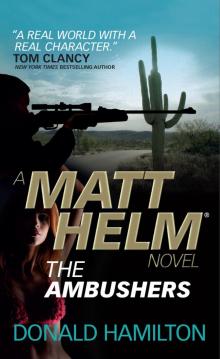 The Ambushers
The Ambushers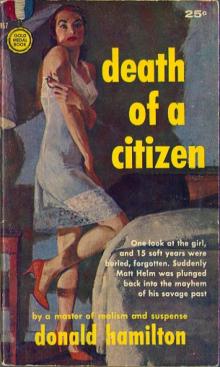 Death of a Citizen mh-1
Death of a Citizen mh-1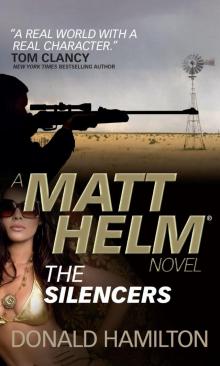 The Silencers
The Silencers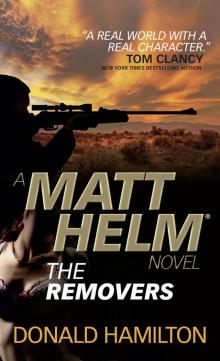 The Removers
The Removers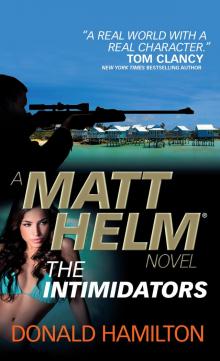 The Intimidators
The Intimidators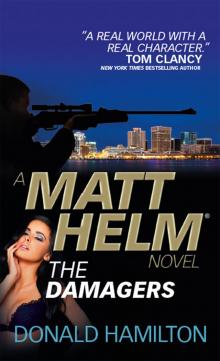 The Damagers
The Damagers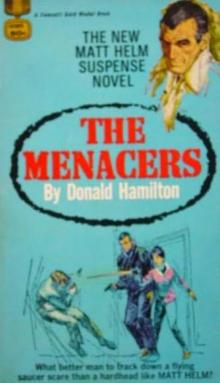 The Menacers mh-11
The Menacers mh-11 The Retaliators
The Retaliators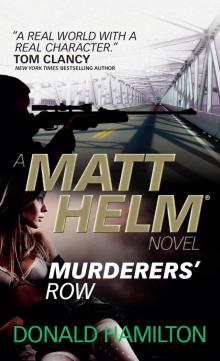 Murderers' Row
Murderers' Row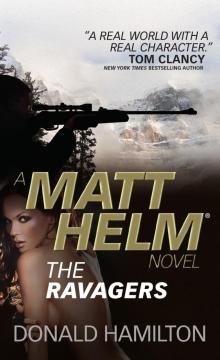 The Ravagers
The Ravagers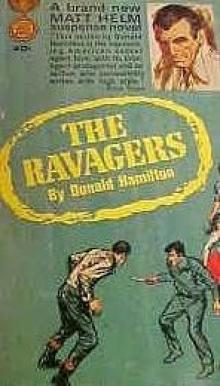 The Ravagers mh-8
The Ravagers mh-8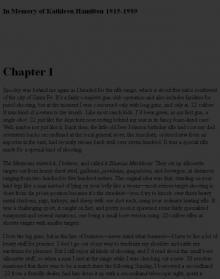 The Threateners
The Threateners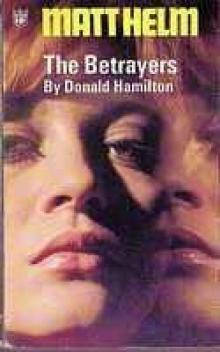 The Betrayers mh-10
The Betrayers mh-10